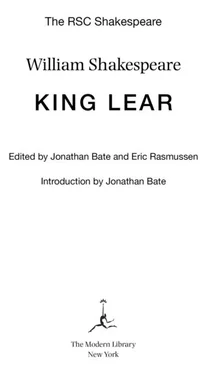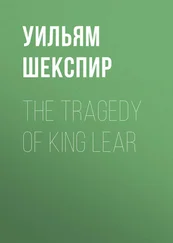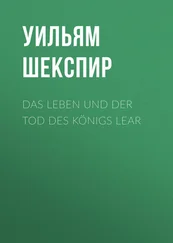уильям шекспир - King Lear
Здесь есть возможность читать онлайн «уильям шекспир - King Lear» весь текст электронной книги совершенно бесплатно (целиком полную версию без сокращений). В некоторых случаях можно слушать аудио, скачать через торрент в формате fb2 и присутствует краткое содержание. Год выпуска: 2011, ISBN: 2011, Издательство: Random House Publishing Group, Жанр: Старинная литература, на английском языке. Описание произведения, (предисловие) а так же отзывы посетителей доступны на портале библиотеки ЛибКат.
- Название:King Lear
- Автор:
- Издательство:Random House Publishing Group
- Жанр:
- Год:2011
- ISBN:978-1-58836-828-7
- Рейтинг книги:3 / 5. Голосов: 1
-
Избранное:Добавить в избранное
- Отзывы:
-
Ваша оценка:
- 60
- 1
- 2
- 3
- 4
- 5
King Lear: краткое содержание, описание и аннотация
Предлагаем к чтению аннотацию, описание, краткое содержание или предисловие (зависит от того, что написал сам автор книги «King Lear»). Если вы не нашли необходимую информацию о книге — напишите в комментариях, мы постараемся отыскать её.
King Lear — читать онлайн бесплатно полную книгу (весь текст) целиком
Ниже представлен текст книги, разбитый по страницам. Система сохранения места последней прочитанной страницы, позволяет с удобством читать онлайн бесплатно книгу «King Lear», без необходимости каждый раз заново искать на чём Вы остановились. Поставьте закладку, и сможете в любой момент перейти на страницу, на которой закончили чтение.
Интервал:
Закладка:
The RSC Shakespeare
Edited by Jonathan Bate and Eric Rasmussen
Chief Associate Editor: Héloïse Sénéchal
Associate Editors: Trey Jansen, Eleanor Lowe, Lucy Munro,
Dee Anna Phares, Jan Sewell
King Lear
Textual editing: Eric Rasmussen and Trey Jansen
Introduction and Shakespeare’s Career in the Theater: Jonathan Bate
Commentary: Penelope Freedman and Héloïse Sénéchal
Scene-by-Scene Analysis: Esme Miskimmin
In Performance: Karin Brown (RSC stagings), Jan Sewell (overview),
Jonathan Bate (captions)
The Director’s Cut (interviews by Jonathan Bate and Kevin Wright):
Adrian Noble, Deborah Warner, Trevor Nunn
Editorial Advisory Board
Gregory Doran, Chief Associate Director,
Royal Shakespeare Company
Jim Davis, Professor of Theatre Studies, University of Warwick, UK
Charles Edelman, Senior Lecturer, Edith Cowan University,
Western Australia
Lukas Erne, Professor of Modern English Literature,
Université de Genève, Switzerland
Jacqui O’Hanlon, Director of Education, Royal Shakespeare Company
Akiko Kusunoki, Tokyo Woman’s Christian University, Japan
Ron Rosenbaum, author and journalist, New York, USA
James Shapiro, Professor of English and Comparative Literature,
Columbia University, USA
Tiffany Stern, Professor and Tutor in English, University of Oxford, UK

2009 Modern Library Paperback Edition
Copyright © 2007, 2009 by The Royal Shakespeare Company
Interview responses by Deborah Warner in “Director’s Cut”
copyright © 2009 by Deborah Warner
All rights reserved.
Published in the United States by Modern Library, an imprint of The
Random House Publishing Group, a division of
Random House, Inc., New York.
MODERN LIBRARY and the TORCHBEARER Design are registered trademarks
of Random House, Inc.
“Royal Shakespeare Company,” “RSC,” and the RSC logo are trademarks or registered trademarks of The Royal Shakespeare Company.
The version of King Lear and the corresponding footnotes that appear in this volume were originally published in William Shakespeare Complete Works , edited by Jonathan Bate and Eric Rasmussen, published in 2007 by Modern Library, an imprint of The Random House Publishing Group, a division of Random House, Inc.
eISBN: 978-1-58836-828-7
www.modernlibrary.com
v3.1_r1
CONTENTS
Cover
Title Page
Copyright
Introduction
An Old Man Tottering About the Stage?
The Division of the Kingdom
Ripeness Is All?
This Great Stage of Fools
About the Text
Key Facts
The Tragedy of King Lear
Act 1
Scene 1
Scene 2
Scene 3
Scene 4
Scene 5
Act 2
Scene 1
Scene 2
Act 3
Scene 1
Scene 2
Scene 3
Scene 4
Scene 5
Scene 6
Scene 7
Act 4
Scene 1
Scene 2
Scene 3
Scene 4
Scene 5
Scene 6
Act 5
Scene 1
Scene 2
Scene 3
Textual Notes
Quarto Passages That Do Not Appear in the Folio
Scene-by-Scene Analysis
King Lear in Performance: The RSC and Beyond
Four Centuries of King Lear: An Overview
At the RSC
The Director’s Cut: Interviews with Adrian Noble, Deborah Warner, and Trevor Nunn
Shakespeare’s Career in the Theater
Beginnings
Playhouses
The Ensemble at Work
The King’s Man
Shakespeare’s Works: A Chronology
The History Behind the Tragedies: A Chronology
Further Reading and Viewing
References
Acknowledgments and Picture Credits
INTRODUCTION
AN OLD MAN TOTTERING ABOUT THE STAGE?
“King Lear,” wrote the early nineteenth-century Romantic poet Percy Bysshe Shelley in his Defence of Poetry , “may be judged to be the most perfect specimen of the dramatic art existing in the world.” For all the Romantics, Lear was Shakespeare’s most “sublime” and “universal” play. John Keats wrote a sonnet “On sitting down to read King Lear once again”: having burned his way through the play, he would feel somehow purified and regenerated. For Keats’ contemporary Charles Lamb, Shakespeare’s anatomy of the human condition was so profound and tempestuous that the play seemed too vast for the stage. It is the centerpiece of his essay “On the tragedies of Shakspeare, considered with reference to their fitness for stage representation”:
So to see Lear acted,—to see an old man tottering about the stage with a walking-stick, turned out of doors by his daughters in a rainy night, has nothing in it but what is painful and disgusting. We want to take him into shelter and relieve him. That is all the feeling which the acting of Lear ever produced in me. But the Lear of Shakspeare cannot be acted. The contemptible machinery by which they mimic the storm which he goes out in, is not more inadequate to represent the horrors of the real elements, than any actor can be to represent Lear: they might more easily propose to personate the Satan of Milton upon a stage, or one of Michael Angelo’s terrible figures. The greatness of Lear is not in corporal dimension, but in intellectual: the explosions of his passion are terrible as a volcano: they are storms turning up and disclosing to the bottom that sea his mind, with all its vast riches. It is his mind which is laid bare. This case of flesh and blood seems too insignificant to be thought on; even as he himself neglects it. On the stage we see nothing but corporal infirmities and weakness, the impotence of rage; while we read it, we see not Lear, but we are Lear,—we are in his mind, we are sustained by a grandeur which baffles the malice of daughters and storms; in the aberrations of his reason, we discover a mighty irregular power of reasoning, immethodized from the ordinary purposes of life, but exerting its powers, as the wind blows where it listeth, at will upon the corruptions and abuses of mankind. What have looks, or tones, to do with that sublime identification of his age with that of the Heavens themselves , when in his reproaches to them for conniving at the injustice of his children, he reminds them that “they themselves are old.” What gestures shall we appropriate to this? What has the voice or the eye to do with such things?
For Lamb, the technical necessities of the theater—the backstage machinery that creates the storm, the actor’s repertoire of gestures, looks, and vocal variations—are exterior and superficial distractions from the play’s inward and remorseless exploration of reason and madness, humankind and nature, the corruptions and abuses of power. Few theater lovers would agree with Lamb, but few would deny that the role of Lear presents perhaps the greatest of all challenges to the Shakespearean actor. There is a theater saying that by the time you’re old enough to play it, you are too old to play it.
A generation before the Romantics, Dr. Samuel Johnson confessed that even reading the play was almost too much to bear: “I was many years ago so shocked by Cordelia’s death, that I know not whether I ever endured to read again the last scenes of the play till I undertook to revise them as an editor.” The shock for Johnson was both emotional and moral. The death of Cordelia—Shakespeare’s boldest alteration of his sources, in all of which she survives—was an extraordinary breach of the principal that Johnson called “poetical justice,” whereby “a play in which the wicked prosper, and the virtuous miscarry, may doubtless be good, because it is a just representation of the common events of human life: but since all reasonable beings naturally love justice, I cannot easily be persuaded, that the observation of justice makes a play worse; or, that if other excellencies are equal, the audience will not always rise better pleased from the final triumph of persecuted virtue.” It had been in order to impose poetical justice on the play that during the 1680s Nahum Tate, author of the hymn “While Shepherds Watched Their Flocks by Night,” had rewritten
Читать дальшеИнтервал:
Закладка:
Похожие книги на «King Lear»
Представляем Вашему вниманию похожие книги на «King Lear» списком для выбора. Мы отобрали схожую по названию и смыслу литературу в надежде предоставить читателям больше вариантов отыскать новые, интересные, ещё непрочитанные произведения.
Обсуждение, отзывы о книге «King Lear» и просто собственные мнения читателей. Оставьте ваши комментарии, напишите, что Вы думаете о произведении, его смысле или главных героях. Укажите что конкретно понравилось, а что нет, и почему Вы так считаете.












